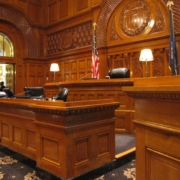What Do I Need to Know About My Security Deposit
If you are a renter and are involved in a dispute with your landlord, you have rights available to you that you might be unaware of. Here is a list of common landlord/tenant problems and how to avoid them.
The most common disagreement between landlords and tenants centers on refunding a tenant’s security deposit. A security deposit is any money a landlord takes from a tenant other than the advance payment of rent. Unlike rent, which belongs to the landlord, a security deposit is the tenant’s property (unless and until properly used to remedy a tenant’s rental default and/or to compensate a landlord for damage and cleaning.) Thus, under California law, amounts paid as security must be held by the landlord for the tenant. [ref]Ca Civil § 1950.5(d)[/ref] Landlords are allowed to retain some or all of a tenant’s security deposit if certain conditions are met, but they must follow strict guidelines set forth by California statute.
California law allows a landlord to use a tenant’s security deposit for four purposes:
For unpaid rent For cleaning the rental property when the tenant moves out, but only to return the property to the condition it was when the tenant moved in:
- For repair of damages, other than normal wear and tear, caused by the tenant or the tenant’s guests; and
- If specified in the lease or rental agreement, for the cost of restoring or replacing furniture, furnishings, or other items of personal property (including keys), other than because of normal wear and tear.
A landlord can only withhold the amount of the security deposit that is reasonably necessary for the above-stated purposes. The security deposit cannot be used for repairing defects that existed prior to the tenant’s move in, for conditions caused by normal wear and tear, or for cleaning a unit that is in the same condition as when the tenant moved in. Furthermore, a lease or rental agreement can never state that a security deposit is “nonrefundable”.
If any of the conditions outlined above are met and a landlord wishes to retain some or all of a tenant’s security deposit, the landlord must follow strict guidelines within a 21 day deadline. Pursuant to Ca Civil § 1950.5(g), within 21 calendar days after a tenant’s vacancy, the landlord must do both of the following:
- Itemized Statement: The landlord must provide the tenant, by personal delivery or postage prepaid first-class mail, with a copy of an itemized statement indicating the basis for and amount of any security received and the disposition of that security (i.e., showing what amounts are being retained and for what reasons); and
- Refund: The landlord must also return to the tenant “any remaining portion of the security” (i.e. amounts that cannot lawfully be retained).
If a landlord is withholding security deposit funds because of work done to repair damages to the property beyond normal wear and tear, additional steps must also be taken. Along with the itemized statement, the landlord must also include copies of documents showing charges incurred and deducted by the landlord to repair or clean the premises as follows:
- If the landlord or landlord’s employee did the work, the itemized statement shall reasonably describe the work performed. The itemized statement shall include the time spent and the reasonable hourly rate charged.[ref]Ca Civil § 1950.5(g)(2)(A)[/ref]
- If the landlord or landlord’s employee did not do the work, the landlord shall provide the tenant a copy of the bill, invoice, or receipt supplied by the person or entity performing the work. The itemized statement shall provide the tenant with the name, address, and telephone number of the person or entity, if the bill, invoice or receipt does not include that information.[ref]Ca Civil § 1950.5(g)(2)(B)[/ref]
- If the landlord deducted funds for materials or supplies, the landlord must provide the tenant with copies of the invoice or receipt.[ref]Ca Civil § 1950.5(g)(2)(C)[/ref]
- The landlord is allowed to make a good faith estimate of repair charges and deduct this amount from a tenant’s security deposit in two situations:
1. The repair is being done by the landlord or an employee and cannon reasonably be completed within the 21 days; or
2. Services or materials are being supplied by another person or business and the landlord does not have the invoice or receipt within the 21 days.
In either situation, the landlord may deduct the good faith estimated amount from a tenant’s security deposit. In situation 2 above, the landlord must include the name, address and telephone number of the person or business that is supplying the services or materials. Within 14 calendar days after completing the repairs or receiving the invoice or receipt, the landlord must mail or deliver to you a corrected itemized statement, the aforementioned invoices and receipts, and any refund to which you are entitled.[ref]Ca Civil § 1950.5(g)(3)[/ref]
Note, however, that the landlord is not required to provide the documentation listed above if the deductions for the repairs and cleaning together do not exceed $125 or the tenant waived his/her right to the documentation.[ref]Ca Civil § 1950.5(g)(4)[/ref]
If, within the statutory 21 calendar day period, the landlord fails to provide the tenant with the requisite written accounting of the portion of the security deposit being withheld, the right to retain all or any part of the security has not been perfected and the landlord must return the entire deposit to the tenant. In other words, the landlord forfeits the benefit of the §1950.5(g) “summary deduct-and-retain” procedure.[ref]Ca Civil § 1950.5(e)[/ref]
California law makes it clear what steps need to be taken for landlords to withhold a tenant’s security deposit. If a landlord fails to comply with any of the required steps above, the tenant is entitled to a full refund of his/her deposit. If your landlord is currently withholding your deposit and you think you are entitled to a refund, give us a call to discuss your situation. The law is on your side.












